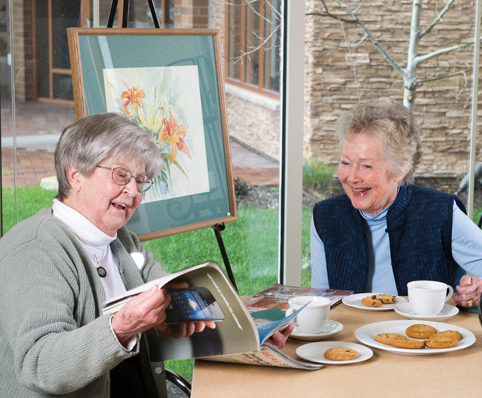Neurocognitive Disorders: What’s New in 2015
Overview
| Registration |
|---|
There is no cost to attend but registration is requested. You must login or create an account before enrolling in this educational activity.Once you're logged in, please click on the "ENTER" button to your right. Your attendance will then be confirmed. |
Agenda
| Time | Presentation | |
|---|---|---|
| 8 am | Registration | |
| 8:30 am | Basic Neuropathology of Neurocognitive Disorders | |
| 9:15 am | Diagnostic Methods for Determining the Extent of the Cognitive Decline | |
| 10:15 am | Lifestyle and Risk Factors for Cognitive Decline | |
| 11 am | Managing Difficult Behaviors | |
| 11:30 am | Adjourn | |
Target Audience
Medical, nursing, other clinicians, social workers, and health care professionals, DMU faculty, clinic staff, and students, direct caregivers, and general public.
Purpose
The purpose of this educational session is to educate the attendees on the different aspects of neurocognitive disorders and different diagnostic methods and treatment options. Based on recent research, the speakers will also share their extensive experience on the importance of lifestyle and maintaining cognitive vitality.
Objectives
- Share the new terminologies for different types of dementias.
- Discuss the new pathology of dementia.
- Discuss different diagnostic methods for determining the extent of the cognitive decline.
- Share recent research on cognitive reserve and the relationship between lifestyle and maintaining cognitive vitality.
- Share current trends of psychoactive medications used for behavior problems of dementia.
- Facilitate discussion on setting targets for psychoactive medication use reduction in patients with dementia.
Why You'll Want To Attend

In the 2012 article, “Practical Guidelines for the Recognition and Diagnosis of Dementia,” the Journal of the American Board of Family Medicine reported that “despite the benefits of early intervention, dementia remains underdiagnosed; an estimated 50% of primary care patients aged older than 65 years have not been diagnosed by their PCPs. A primary reason cited for the delay in AD diagnosis has been the difficulty in identifying early signs of AD by both PCPs and the general public.” For the target audience, expanded knowledge of the different dementias, diagnostic methods and treatment approaches could help improve clinical care.
In addition, national quality measures for nursing homes indicate that on average, 20% of residents are taking a psychoactive medication. However, research has shown that psychoactive medications frequently do not improve the quality of life for the patient with dementia and in some instances may have detrimental effects on the patient’s physical health and cognitive ability. Holistic approaches that address the mind, body, and spirit of the person focus on the person’s well-being, rather than only the management of the disease.
Speakers
- Robert Bender, MD
Family Health Center, Geriatric Medicine and Memory Center, Broadlawns Medical Center
Biography
- Yogesh Shah, MD, MPH, FAAFM
Associate Dean, Global Health and Clinician, Family Medicine Clinic, Des Moines University
Biography
Everyone in a position to control the content of this educational activity will disclose to the CME provider and to attendees all relevant financial relationships with any commercial interest.
Continuing Education Credit
 MD: This activity has been planned and implemented in accordance with the accreditation requirements and policies of the Iowa Medical Society (IMS) through the joint providership of Des Moines University (DMU) and WesleyLife. DMU is accredited by IMS to provide continuing medical education for physicians. DMU designates this live activity for a maximum of 3.0 AMA PRA Category 1 Credit(s)™. Physicians should claim only the credit commensurate with the extent of their participation in the activity.
MD: This activity has been planned and implemented in accordance with the accreditation requirements and policies of the Iowa Medical Society (IMS) through the joint providership of Des Moines University (DMU) and WesleyLife. DMU is accredited by IMS to provide continuing medical education for physicians. DMU designates this live activity for a maximum of 3.0 AMA PRA Category 1 Credit(s)™. Physicians should claim only the credit commensurate with the extent of their participation in the activity.- DO: Des Moines University is accredited by the American Osteopathic Association (AOA) and approves this live activity for 3.0 AOA Category 1-A credit(s).
- Nursing: Des Moines University continuing education is Iowa Board of Nursing approved provider #112. This live activity has been reviewed and approved for 3.6 continuing education contact hour(s). No partial credit awarded.
- Other: This live activity is designated for 3.0 AMA PRA Category 1 Credit(s)™.
Location
CE Credits
Available Credit
- 3.00 AMA PRA Category 1 Credits™
- 3.00 AOA Category 1A
- 3.00 CE Contact Hour(s)
- 3.60 IBON

 Facebook
Facebook Twitter
Twitter LinkedIn
LinkedIn Forward
Forward